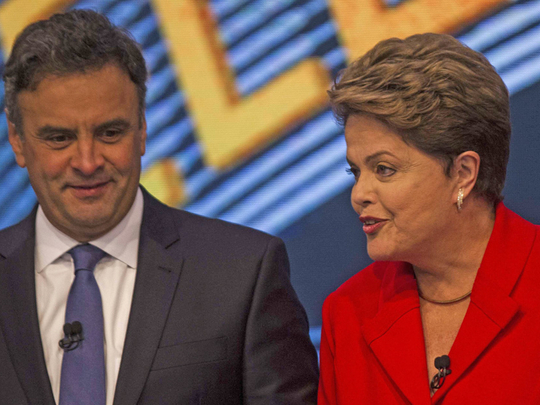
RIO DE JANEIRO: Brazilian President Dilma Rousseff fought off challenger Aecio Neves’s accusations of corruption as the campaign for Sunday’s vote to choose the next leader of the world’s seventh-largest economy wrapped up.
After weeks of fighting tooth and nail in a race that was too close to call, the leftist incumbent has managed to carve out a six- to eight-point lead going into Saturday’s campaign-free period of reflection before voters cast their ballots.
But her centre-right challenger sought to claw back his one-time lead at their final debate Friday night by attacking Rousseff on the corruption scandals that have dogged her Workers’ Party (PT) almost throughout its 12 years in power.
He opened the debate by asking her about an 11th-hour media report claiming she and her PT predecessor, Luiz Inacio Lula da Silva, “knew everything” about an alleged multi-billion-dollar kickback scheme at state oil giant Petrobras.
It was, he said, the culmination of “the most sordid campaign in history.”
Rousseff, 66, aggressively denied the report by conservative newsmagazine Veja, which sped up publication to come out the day of the debate.
“Veja has presented no proof,” she said, condemning the article as ‘slander and defamation’ and repeating her vow to sue.
“The people aren’t stupid. The people know this information is being manipulated,” she said.
“I’m certain they’re going to show their indignation on Sunday.”
When Neves zeroed in on the congressional vote-buying scandal that brought down key members of Lula’s administration, Rousseff fired back by bringing up a similar scandal from the 1990s that rocked his Social Democracy Party (PSDB) in Minas Gerais, where Neves was later governor.
“There was a trial over the ‘big monthly allowance’ scandal linked to my party. They were convicted and went to jail,” she said.
“But in the ‘big monthly allowance’ scandal in your party, no one was ever convicted or punished... You’re the first to talk about corruption, but I can list all the times you guys weren’t judged and walked free,” she added, rattling off a list of past scandals.
She then went for the jugular, adding that one of the best-known of the Minas Gerais group “is the coordinator of your campaign” in the state.
Neves, the 54-year-old scion of a famous political family, retorted: “The best measure against corruption would be to take the PT out of power.”
But the tone of the debate was more civil than in the pair’s first two head-to-head encounters, when they traded vitriolic, highly personal attacks in a bid to break a statistical dead heat between them after the October 5 first-round vote.
Prodded by questions from an audience of undecided voters — and probably by a recent poll finding that 71 per cent of Brazilians were fed up with the negativity of the campaign — they also addressed such issues as inflation, the recession-hit economy, education, housing and sanitation.
Brazil is divided along social lines heading into the election.
The poor, particularly in the impoverished northeast, are loyal to the PT thanks to landmark social programs that benefit 50 million people and have helped lift 40 million from poverty in the past 12 years.
The country’s elites are meanwhile exasperated with interventionist economic policies such as petrol price controls and high taxes, and want to return to the market-friendly days of PSDB president Fernando Henrique Cardoso (1995-2003).
The battle is for the middle class in the industrialised southeast, the cradle of million-strong protests against corruption and poor public services that shook the country last year.
This demographic is torn between voters loyal to Lula for presiding over nearly a decade of prosperity and social gains from 2003 to 2011, and those frustrated with Rousseff’s government.
But it is this group that has given the last-minute edge to the incumbent, a former leftist guerrilla who was jailed and tortured for fighting Brazil’s 1964-1985 dictatorship.
Polling firm Datafolha gave her 53 per cent to 47 per cent for Neves on Thursday, while Ibope put Rousseff at 54 per cent and the senator at 46 per cent.
The firms are both due to release final polls later Saturday.












